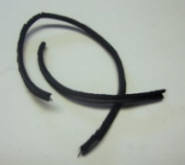

Proudly Serving Austin Since 1988
512-339-0971
Monday -Friday 8:00am-5:00pm
Closed Saturday & Sunday
*** All Products We Stock Are Displayed Assembled & Are Serviced And Tested At The Point Of Sale ***
We reserve the right to change prices without changing the pricing on our website
Austin Outdoor Power Equipment, Inc
.
11104 North Lamar, Unit G, Austin TX 78753 -
512-339-0971
Copyright © 2010 AOPE
all rights reserved.



Multi-functional fuel stabilizer proven to prevent ethanol-related problems while stabilizing fuel up to 3 years.
Ultra-Concentrated.
For 2 and 4-cycle engines.
Protects all engine components from corrosion / varnish due to ethanol blended fuels.
Envelopes water so it passes safely through the fuel system and does not bond.
Keeps your engine starting and running easily all year.
Made in the U.S.A and EPA registered (including automobile use).
Details
Prevent future engine problems with Ethanol Shield. This year round fuel stabilizer is used for your power equipment with 2-cycle and 4-cycle engines. This preventative maintenance formula eliminates then prevents ethanol related problems. It removes water, prevents corrosion, provides easy engine starting all year, and keeps stored fuel fresh.
This Product is NOT a replacement for 2 cycle oil,
continue to add oil as recommended by the manufacturer of the engine.
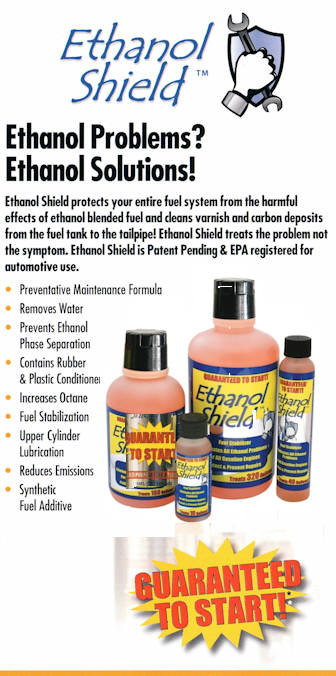
The Problem with Ethanol
Ethanol Harms Rubber and Plastic
Did you know that ethanol can have devastating effects on power equipment? Ethanol blended gasoline can damage plastic and rubber fuel system components, particularly in older power equipment not designed to tolerate ethanol. In the example to the right, the bowl gasket became brittle and non pliable. The 2-cycle carburetor diaphragms on the far right are stiff causing starting and running problems. The primer line and return lines are brittle causing fuel to leak.
Ethanol Corrodes Engines
Ethanol is corrosive by nature and hygroscopic (attracts water), particularly when higher amounts of water are present. This type of damage to a carburetor is typical when phase separation occurs and the highly corrosive ethanol / water mixture corrodes fuel system components.
Ethanol Causes Fuel Decay
High amounts of oxygen in ethanol blended fuels cause gasoline to decay faster, and if left standing for long periods of time, the decaying fuel leaves varnish and sludge deposits as depicted in these carburetor images.
Gasoline and milk are both organic -- they decompose the same way. A foul, sour smell indicates BAD GAS! Power equipment not treated with an ethanol fuel stabilizer will become hard to start within 30 days. Gasoline will decay in as little as 60 days!
Phase Separation
2 Cycle Phase Separation
The engine to the right has been destroyed from phase separated fuel. Ethanol is hygroscopic (absorbs water), the vial to the right is from the fuel tank of this engine. The fuel on top is gold in color because 2 cycle oil will only bond with the gasoline. The octane is also lower because the ethanol has separated from it and bonded with the water below. Approximately ¾ of the clear fluid in the bottom of the vial is ethanol. The ethanol water mix settles in the bottom of the fuel tank and is picked up by the fuel system, then delivered to the carburetor. The engine ran on this ethanol mixture, causing it to run extremely hot with no lubrication. This damage occurs in only a few minutes of operation. The engine also ran out of control, which poses serious safety concerns for the equipment operator.
4 Cycle Phase Separation
This carburetor suffered from severe phase separation. More than likely, rain water entered into this fuel system, creating the severe corrosion you see. This carburetor cannot be repaired and must be replaced.
Engine Failure from Varnished Fuel
This piston and crankshaft assembly came from a 2-cycle engine that ran on stale fuel. The engine was hard to start and had low power. It ran long enough to gum all of the internal components, including sticking the rings.
Why bad gas occurs
The problem with gasoline containing ethanol (E-10) is when it is left standing in a fuel system for long periods of time with fluctuations in temperature & humidity -- the fuel will start to decay in as little as 60 days. What would happen if you left milk in the back of the refrigerator for 60 days? E-10 gasoline decomposes the same way, just not as visual -- a foul, sour smell is prevalent when E-10 is decaying.
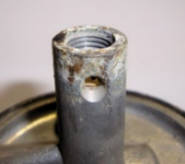
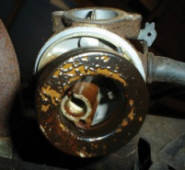
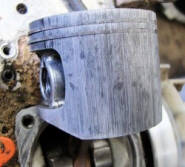
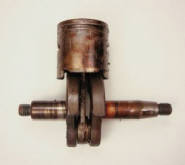
Why does bad fuel damage engines?
Today's modern fuel's contain ETHANOL and BIO-DIESEL which attract water and cause issues such as phase separation, corrosion, fuel decay, instability, and contaminants. These issues directly affect your engines and power equipment in a negative way.
Ethanol Blended Gasoline
Ethanol blended gasoline (the E-10 gas you buy at the pump) contains 10% Ethanol. Ethanol in fuel attracts water and settles on the bottom of your fuel tank to cause a corrosive Ethanol / Water mixture (phase separation). This corrosive mix moves from the fuel tank to your engine causing problems such as varnish / gum, severe corrosion, and dried / brittle rubber and plastic parts.
